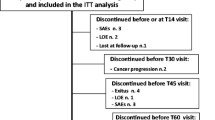Abstract
Nausea and emesis are common side effects of opioid drugs administered for pain relief in cancer patients. The aim of this study was to compare the anti-emetic efficacy and safety of ondansetron, placebo and metoclopramide in the treatment of opioid-induced nausea and emesis (OIE) in cancer patients. This was a multinational, multicentre, double-blind, parallel group study in which cancer patients who were receiving a full opioid agonist for cancer pain were randomised to receive one of oral ondansetron 24 mg once daily, metoclopramide 10 mg three times daily, or placebo. Study medication was started only if the patient experienced nausea and/or emesis following opioid administration. Efficacy and safety assessments were made over a study period of 24 h from the time of the first dose of anti-emetics/placebo. The study was terminated prematurely because of the difficulties in recruiting patients satisfying the stringent entry criteria. Ninety-two patients were included in the intent-to-treat population: 30 patients received placebo, 29 patients ondansetron and 33 patients metoclopramide. There was no statistically significant difference between the groups in the proportion achieving complete control of emesis (33% of patients on placebo, 48% on ondansetron and 52% on metoclopramide) or complete control of nausea (23% of patients on placebo, 17% on ondansetron and 36% on metoclopramide). Rescue anti-emetics were required in 8 of 33 patients on metoclopramide, 4 of 29 on ondansetron, and 3 of 30 on placebo. The incidence of adverse events was very low and similar in all treatment groups. Neither ondansetron 24 mg once daily nor metoclopromide 10 mg t.d.s. given orally was significantly more effective than placebo in the control of OIE in cancer patients.
Similar content being viewed by others
Author information
Authors and Affiliations
Additional information
Electronic Publication
Rights and permissions
About this article
Cite this article
Hardy, J., Daly, S., McQuade, B. et al. A double-blind, randomised, parallel group, multinational, multicentre study comparing a single dose of ondansetron 24 mg p.o. with placebo and metoclopramide 10 mg t.d.s. p.o. in the treatment of opioid-induced nausea and emesis in cancer patients. Support Care Cancer 10, 231–236 (2002). https://doi.org/10.1007/s00520-001-0332-1
Published:
Issue Date:
DOI: https://doi.org/10.1007/s00520-001-0332-1




